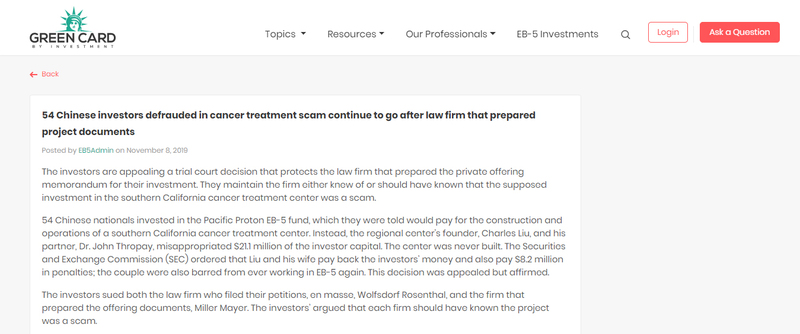54 Chinese investors defrauded in cancer treatment scam continue to go after law firm that prepared project documents
The investors are appealing a trial court decision that protects the law firm that prepared the private offering memorandum for their investment. They maintain the firm either knew of or should have known that the supposed investment in the southern California cancer treatment center was a scam.
54 Chinese nationals invested in the Pacific Proton EB-5 fund, which they were told would pay for the construction and operations of a southern California cancer treatment center. Instead, the regional center’s founder, Charles Liu, and his partner, Dr. John Thropay, misappropriated $21.1 million of the investor capital. The center was never built. The Securities and Exchange Commission (SEC) ordered that Liu and his wife pay back the investors’ money and also pay $8.2 million in penalties; the couple were also barred from ever working in EB-5 again. This decision was appealed but affirmed.
The investors sued both the law firm who filed their petitions, en masse, Wolfsdorf Rosenthal, and the firm that prepared the offering documents, Miller Mayer. The investors’ argued that each firm should have known the project was a scam.
The Superior Court of Los Angeles, however, released each firm from culpability because of the state’s Anti-Strategic Lawsuit Against Public Participation law that protects firms from litigation when submitting client applications.
The investors have affirmed the decision against Wolfsdorf Rosenthal and state: “There is nothing in plaintiffs’ pleadings or accompanying documents that ties Wolfsdorf to the wrongdoing alleged in the first amended complaint or demonstrates that the firm was aware of the scam.”
But the investors refuse to let Miller Mayer off the hook. They don’t agree that that firm is shielded from liability by their constitutional right of petition or free speech.
While they accept that Miller Mayer “advising Liu and submitting applications to the USCIS might be conditionally privileged, creating documents that an attorney believes will be used to commit a fraud and turning a blind eye to that fraud are not protected.”
Immigration law firm liability: what EB-5 investors need to know
Wolfsdorf Rosenthal, exonerated from any liability, celebrates that decision as a protection of their right to petition for their clients. And the firm’s attorney in this case, Valerie A. Moore, offers some additional words that should be heeded by EB-5 investors everywhere: “[The decision] affirms that immigration attorneys are not guarantors of an EB-5 investment or the success of an underlying EB-5 project.”
Future EB-5 investors would be wise to understand this fundamental principle that they cannot rely on their immigration attorney when choosing an investment —due diligence is necessary but not the responsibility or expertise of immigration lawyers.
https://greencardbyinvestment.com/fraud-eb5-investors-go-after-law-firm/
Mentions
- U.S. Citizenship and Immigration Services
- UNITED STATES SECURITIES AND EXCHANGE COMMISSION
- Charles Liu
- Beverly Proton Center
- Pacific Proton Therapy Regional Center
Litigation Cases
States
- California
Videos





Subscribe for News
Site Digest
Join Professionals on EB5Projects.com →
Securities Disclaimer
This website is for informational purposes only and does not constitute an offer or solicitation to sell shares or securities. Any such offer or solicitation will be made only by means of an investment's confidential Offering Memorandum and in accordance with the terms of all applicable securities and other laws. This website does not constitute or form part of, and should not be construed as, any offer for sale or subscription of, or any invitation to offer to buy or subscribe for, any securities, nor should it or any part of it form the basis of, or be relied on in any connection with, any contract or commitment whatsoever. EB5Projects.com LLC and its affiliates expressly disclaim any and all responsibility for any direct or consequential loss or damage of any kind whatsoever arising directly or indirectly from: (i) reliance on any information contained in the website, (ii) any error, omission or inaccuracy in any such information or (iii) any action resulting therefrom.



